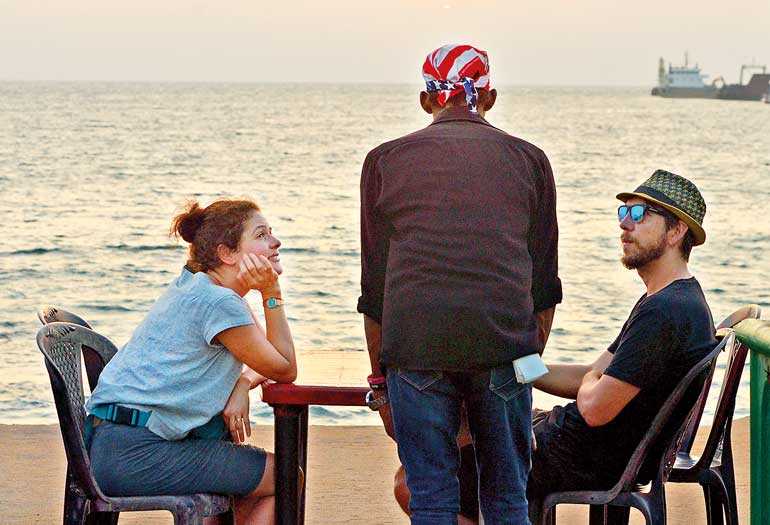Saturday Feb 07, 2026
Saturday Feb 07, 2026
Tuesday, 3 September 2019 00:00 - - {{hitsCtrl.values.hits}}

Sri Lanka has a growing tourism industry, that hasn’t showed signs of stopping – despite slow growth at times over the last few decades and especially during the last few months. However, as always, Sri Lanka is slowly but surely bouncing back after the recent tragic terrorist attack also dubbed as the ‘Easter Attack’ that shook the country and also many parts of the world. 
The main factor that has always contributed to Sri Lanka’s surge in tourism is, and has always been the island’s unique placement on the world map – the different routes by both air and sea which passes through the island has always attracted foreigners visiting the island for different lengths of time. Starting from the times of tourism development in Sri Lanka post the Second World War, the governing bodies has always chosen to pursue promoting local tourism.
This can be observed due to the construction of the iconic and timeless ‘Galle Face Hotel’ and also the ‘Grand Oriental Hotel’ located very close to the Colombo Port to accommodate the multitude of passengers passing through the Port of Colombo.
This trend then later grew, and expanded to accommodate both local and international hotel chains, which to date have showed no signs of slowing down. The industry has grown so much over the last few decades, that Sri Lanka now has international hotel chains operating out of the central business hub, also known as Colombo due to the growing demand for luxury accommodation for tourists travelling to Sri Lanka.
Post-civil war tourism development in the country
Since the end of the civil war a decade ago, Sri Lanka’s tourism has been booming more than ever. With this growing number of customers comes the growing demand for hotels and with that comes the growing demand for talent in the hospitality industry. Local industry experts and veterans have predicted that the Sri Lankan hotel industry will need a total of at least 250,000 ‘direct’ staff of all capacities over the next three years.
But what do we mean by ‘direct staff’? Putting the age-old question to rest, this includes the staff directly involved in the hospitality industry, serving for hospitality companies – starting from front office staff, food and beverage staff, maintenance staff, kitchen staff, sales and marketing teams, human resources teams and finance teams. This is not taking into account the indirect staff or supporting staff of the industry such as tuk and cab drivers, shop keepers and workers and tour guides to name a few.
The growing need for more trained professionals
In 2018, the Ministry of Tourism said that Sri Lanka will need over a 100,000 new staff with the expected number of star-class hotels that are to come up as the country has projected over $ 2.8 billion over the next couple of years. This was informed during the 39th graduating ceremony of the Sri Lanka Institute of Tourism and Hotel Management, formerly known as the Ceylon Hotel School and School of Tourism.
Since the end of the civil war a decade ago, Sri Lanka’s tourism has been booming more than ever. With this growing number of customers comes the growing demand for hotels and with that comes the growing demand for talent in the hospitality industry
The school trains over 6,000 students annually across various aspects of the hospitality industry in the country. The Tourism Ministry also quoted: “Sri Lanka’s rapidly growing tourism industry will see the addition of nearly 17,000 industry standard rooms in the next 3 years and we will need at least over 100,000 new workers to serve in these hotels.”
Attitude is everything
With this growing demand for hotels, comes the demand for talent. And with that in mind, it is important for employers to remember that they must always hire for attitude. An employee having the ‘correct’ attitude will do well for both the employee as well as the employer than hiring the candidate who would tick off all the requirements of the job advertisement.
Many of today’s job interviews have a standard and outdated hiring process. Many organisations today would hire to tick off boxes around paper qualifications, number of years of industry experience and diversity. But organisations hardly hire for attitude.
Having the perfect score, but not having great attitude will start to create a large dent in the company’s customer service value chain. And what do we mean by having the right attitude? Customers prefer a courteous service, just as much as they would expect to be served professionally. Being professional, yet rude isn’t the right attitude.
Not being customer-centric is unpleasant for the customer, as they would expect to be treated well for their pay. The wrong attitude will harm the reputation of the hotel whilst the right attitude even from the doorman to the server at the restaurant will make it a pleasing experience for the customer, prompting them to revisit you in the future – which is something to think about for all hiring managers and senior managers in the hotel industry.
Changing conservative mind-sets: the tourism industry is not a ‘cheap’ job
Another issue to be addressed, is changing the cultural perception on daughters joining the hotel industry. Traditionally, parents have viewed the industry as a male-dominated, for-males only industry and some even consider it a ‘disgrace’ or a ‘cheap’ and a ‘disreputable’ job to have their daughters join the hotel industry.
The traditional view has been that daughters must choose ‘reputable’ jobs such as teaching or accounting if they do not wish to choose the paths of medicine, other sciences or accounting. The hotel industry has been viewed as an optional and ‘if-all-fails’ job rather than a proper vocation. It is high time that the industry veterans took an initiative to change the rural mindset of parents and also create a more inclusive, and female supportive industry.
Whilst many hotels are quick to have a standard hiring process, very few put time, effort, money and thought to create a comprehensive and well-thought out succession plan for their employees
A look at continuity and succession
Whilst many hotels are quick to have a standard hiring process, very few put time, effort, money and thought to create a comprehensive and well-thought out succession plan for their employees. Most often, as the general purview of Sri Lankan way of having and sustaining a career, people must often take matters into their own hands. Instead of letting your staff blindly make decisions, without proper guidance and advice, it’s recommended that companies have a well-defined succession plan and appraisal process. When visiting hotels in Sri Lanka, people might often come across many familiar faces across multiple hotels. This is due to people changing across multiple employers over the course of few years and sometimes even months. When placing a finger and trying to understand the root cause of this issue, it was found that there is a lack of succession planning and an appraisal process.
Most hotels can bring down their attrition rates and ensure that talent stay within their hotel/chain and grows along with them should they spend time crafting a well thought out succession plan and appraisal system (including a 360-degree appraisal system).
With the change of times, comes more career-minded individuals. The lack of succession planning and a solid base for employees to grow, hotels can expect attrition rates to rise as employees would leave after gathering the expected years of experience for a foreign job.
Sri Lankan tourism has a long way to go, but we are certainly off to a good start! So instead of losing our talent, we must look at retaining, growing and developing our local talent.
(The writer is a veteran hotelier with over 33 years of experience. He is an accountant by profession turned Head of Operations. In addition to his hotelier background, Nirmalan possesses over 20 years of strong financial administration at five-star hotels across the globe. His expertise is spread throughout his various stints in various regions around the world including the US, The Caribbean, Middle East and Singapore as well as holding the position of an operation and commercial oriented Director of Finance, with a wealth of business experience. Nirmalan has worked across international hotels chains including Park Hyatt Jeddah-Marina Saudi Arabia, Le Royal Meridien Abu Dhabi, Al Aqa, Kwait, Forte Nassau Beach Bahamas and Sandy Lane Hotel Barbados. Nirmalan is currently a Fellow Member of British Association of Hospitality Accountants, Fellow Member of the Institute of Management UK (FCMI), and Fellow Member of the Hotel & Catering International Management Association, U.K. (FIH). He is a highly result oriented professional, who believes in cohesive work environments, hiring for attitude, on-time delivery with 90% accuracy rather than late delivery with a 100% accuracy rate. Nirmalan believes that teamwork certainly makes the dream work. He is now retired and consults professionally to a leading international consulting firm, whilst residing in his home in Colombo with his wife and pet Labrador named ‘Penny’.
You can contact him on
[email protected].)